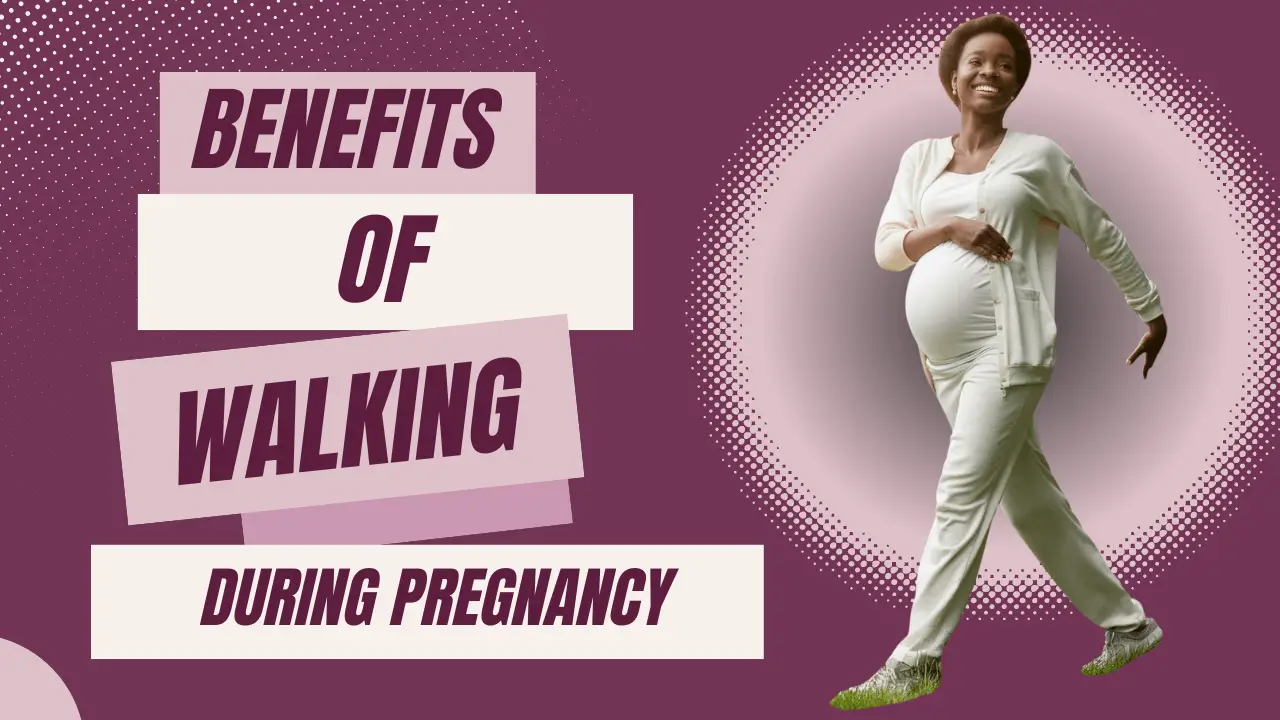It’s important for the mother and the unborn child to remain active during pregnancy. Among the various forms of exercise, walking stands out as one of the simplest and most beneficial activities.
The benefits of walking during pregnancy are numerous, making it an ideal choice for expectant mothers looking to maintain their health and well-being. Walking not only keeps your body in shape but also relieves a lot of frequent pregnancy discomforts.
The benefits are numerous, ranging from elevating your mood to improving cardiovascular health. The top 7 advantages of walking during pregnancy will be discussed in this piece, along with the reasons it should be a regular part of your routine.
Including walking in your routine can have a major positive impact on your health and the health of your unborn child, regardless of whether you are in your first trimester or are almost finished with your pregnancy.
Understanding the Benefits of Walking During Pregnancy:
Walking is a highly suggested workout regimen for expectant mothers because of its ease of use, accessibility, and several health advantages. There are numerous benefits of walking during pregnancy that have a favorable effect on one’s physical and mental health.
Walking is a low-impact exercise that is safe for the majority of expectant mothers and is readily modified to match different stages of pregnancy and fitness levels.

It plays a vital role in preparing the body for delivery and elevating mood, in addition to aiding in maintaining a healthy weight and easing frequent pregnancy discomforts.
Comprehensive Health Benefits
There are numerous health advantages of walking when pregnant. In terms of physical health, it tones muscles, particularly those in the lower body, strengthens the heart, and enhances circulation.
These outcomes lessen the chance of gestational diabetes, control weight growth, and stop excessive edema. Walking is a great way to decompress mentally since it releases endorphins, which lower anxiety and improve mood.
Walking’s rhythmic and repeated qualities can have a calming impact, fostering emotional equilibrium and mental clarity.
Ease of Incorporation into Daily Life
One of the standout benefits of walking during pregnancy is how easily it can be incorporated into daily routines. Walking doesn’t require specific equipment, a gym membership, or a lot of preparation, in contrast to more strenuous kinds of exercise.
Pregnant women can walk in a variety of settings, from a quick stroll around the neighborhood to a leisurely stroll in the park, making it a versatile option that can be tailored to comfort and energy levels.
Preparing for Labor and Beyond
Apart from its instant advantages, walking strengthens the muscles required for birthing and encourages the best placement for the baby, so assisting the body in getting ready for labor.
Walking frequently during pregnancy can help facilitate more easy delivery and hasten the healing process after giving birth. Additionally, walking helps with postpartum weight loss and enhances general well-being by establishing a healthy practice that may be maintained after childbirth.
In conclusion, there are a variety of benefits to walking during pregnancy, including mental, physical, and preparatory benefits that promote a healthy and balanced pregnancy. Expectant mothers can improve their pregnancy experience and set the stage for a less stressful delivery and quicker recovery by being aware of and welcoming these advantages.
1. Improves Circulation and Cardiovascular Health:
Walking is a highly effective way to enhance circulation and support cardiovascular health, both of which are crucial during pregnancy. As your body undergoes significant changes, your heart works harder to pump blood to support both you and your growing baby.
One of the key benefits of walking during pregnancy is that it helps maintain a healthy heart by improving blood flow and ensuring that oxygen and nutrients are efficiently delivered to your baby.

Frequent walking improves blood circulation, which lowers the chance of pregnancy-related problems like blood clots, varicose veins, and swelling. Walking also helps to strengthen the heart muscles, which reduces the risk of hypertension and preeclampsia.
Walking helps to keep you and your baby healthy by improving circulation and cardiovascular function. This supports a more seamless pregnancy and may make labor and delivery simpler. Including regular walks in your routine is a simple and efficient method to protect your heart health while pregnant.
2. Aids in Managing Pregnancy Weight Gain
Managing weight gain during pregnancy is essential for both your health and your baby’s development. One of the significant benefits of walking during pregnancy is its ability to help control weight gain in a safe and manageable way.
Pregnant women should walk because it’s a low-impact workout that increases metabolism and burns calories without straining the body. Walking on a regular basis balances your calorie intake and physical exercise, which aids in maintaining a healthy weight.

It keeps pregnant women from gaining too much weight, which can cause problems including gestational diabetes, high blood pressure, and difficult deliveries. Walking helps you maintain a healthy weight within the suggested ranges and lowers your chance of developing obesity-related problems after giving birth.
Furthermore, walking’s moderate nature guarantees that you maintain your fitness and activity level without overdoing it, which makes it simpler to comfortably and healthily handle the extra weight of pregnancy.
3. Reduces Pregnancy-Related Aches and Pains
Pregnancy often brings about various aches and pains, particularly in the back, hips, and legs, as your body adjusts to carrying extra weight. One of the key benefits of walking during pregnancy is its ability to alleviate these discomforts.
Walking promotes flexibility and reduces stiffness, both of which can exacerbate discomfort, by keeping your muscles and joints supple. Frequent walking helps to stabilize your posture and lessen the strain on your spine by strengthening the muscles that support your hips and back.
This can greatly reduce lower back pain, which is a frequent pregnancy ailment. Walking also improves circulation, which helps lessen edema and cramping in the legs, which are common during the later stages of pregnancy.
As your pregnancy goes on, the rhythmic movement will also help to release tension in your body, relieving general aches and making it easier to move around comfortably. Pregnancy-related aches and pains can be easily managed and reduced by including walking into your daily routine.
4. Enhances Mood and Lowers Stress Levels
Pregnancy can be a time of heightened emotions and stress, which can impact overall well-being. One of the notable benefits of walking during pregnancy is its positive effect on mood and stress levels. Walking causes the body’s natural mood boosters, endorphins, to be released, which helps fight despair and anxiety.
Walking’s repetitive and rhythmic qualities can have a calming impact, assisting in mental clearing and giving you a mental vacation from daily concerns. Frequent walking also contributes to a more balanced and tranquil emotional state by lowering cortisol levels, the hormone linked to stress.

Walking is a great approach to enhance your physical and mental well-being during pregnancy. It’s also a natural way to elevate your mood and better handle stress.
5. Prepares Your Body for Childbirth
Walking plays a crucial role in preparing your body for the demands of childbirth. One of the significant benefits of walking during pregnancy is its ability to strengthen and condition the muscles used during labor.
Frequent walking tones the muscles in your hips, legs, and core—all of which are necessary for withstanding the physical strain of work. Walking also helps your baby settle into the correct head-down position for delivery, which promotes optimal fetal posture. This may result in a simpler and more uneventful birth.
Walking also improves endurance and stamina, which are important for coping with prolonged labor and rehabilitation after delivery. You can better prepare your body for labor by including walking into your daily routine. This will help to make the experience more tolerable and possibly less traumatic.
6. Encourages Better Sleep Patterns
Pregnancy can often disrupt your sleep patterns, leading to difficulties falling and staying asleep. One of the valuable benefits of walking during pregnancy is its positive impact on sleep quality. Walking on a regular basis can help you sleep better at night by regulating your body’s internal clock.
Walking during the day promotes general physical weariness, which in turn naturally promotes better sleep, hence reducing discomfort and restlessness during the night. Exercise also aids in reducing tension and worry, two things that frequently interfere with sleep.
Walking promotes more unbroken and comfortable sleep during pregnancy by improving circulation and easing the physical and emotional strain. Including a regular stroll in your regimen will help you sleep better and rest better overall during your pregnancy.
7. Promotes Healthy Fetal Development
Walking during pregnancy not only benefits your health but also supports the development of your baby. One of the key benefits of walking during pregnancy is its positive impact on fetal health. Walking on a regular basis helps mothers’ circulation, which in turn helps the placenta receive more oxygen and vital nutrients.
This increased blood flow is essential to your baby’s growth and development.
Additionally, walking lowers the risk of diseases like gestational diabetes, which can harm the developing fetus, and helps control weight gain throughout pregnancy.
You may contribute to creating the ideal environment for your baby’s growth by keeping an appropriate weight and engaging in regular exercise. Walking can also guarantee optimal fetal posture, which promotes a healthy delivery procedure.
All things considered, including walking in your routine benefits your health as well as the health of your growing child.
Conclusion:
Incorporating walking into your daily routine offers numerous benefits of walking during pregnancy. Walking promotes your health and the development of your unborn child by increasing circulation, controlling weight gain, lowering stress, and boosting sleep.
You can better prepare your body for labor, elevate your mood, and advance general health by continuing this easy-to-do yet highly beneficial workout. Accepting these advantages prepares the groundwork for a healthier delivery and ensures a more uneventful pregnancy. Click to learn more.
FAQs:
How often should I walk during pregnancy?
Aim for at least 30 minutes of walking most days of the week. Adjust based on your comfort and energy levels.
Is it safe to walk at any point during pregnancy?
Yes, you can safely walk during your pregnancy. However, to make sure it’s appropriate for your particular circumstance, speak with your healthcare practitioner.
Can walking help reduce pregnancy-related back pain?
Yes, walking strengthens muscles and improves circulation, which can alleviate back pain and other pregnancy discomforts.
Does walking influence the baby’s position for birth?
Yes, regular walking can help encourage optimal fetal positioning, which may lead to a smoother delivery.
How does walking improve sleep during pregnancy?
Walking promotes physical fatigue and reduces stress, leading to better sleep quality and fewer disturbances during pregnancy.
